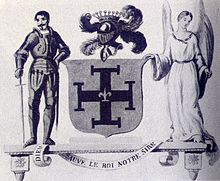Theory of aristocratic duties.
Nobility, distinction, aristocracy or good fortune are privileges which therefore involve corresponding obligations to public service.
Meaning and variants
“Noblesse oblige” is generally used to imply that with wealth, power, and prestige come responsibilities.
In ethical discussion, it is sometimes[citation needed] used to summarize a moral economy wherein privilege must be balanced by duty towards those who lack such privilege or who cannot perform such duty. Finally, it has been used recently to refer to public responsibilities of the rich, famous and powerful, notably to provide good examples of behaviour or to exceed minimal standards of decency. It has also been used to describe a person taking the blame for something in order to solve an issue or save someone else.
History and examples

Figurative armories of “de Mortsauf” in Le lys dans la Vallée by Honoré de Balzac
An early instance of this concept in literature may be found in Homer’s Iliad. In Book XII, the hero Sarpedon delivers a famous speech in which he urges his comrade Glaucus to fight with him in the front ranks of battle. In Pope’s translation, Sarpedon exhorts Glaucus thus:
‘Tis ours, the dignity they give to grace
The first in valour, as the first in place;
That when with wondering eyes our confidential bands
Behold our deeds transcending our commands,
Such, they may cry, deserve the sovereign state,
Whom those that envy dare not imitate!
In Le Lys dans la Vallée, written in 1835 and published in 1836, Honoré de Balzac recommends certain standards of behaviour to a young man, concluding: “Everything I have just told you can be summarized by an old word: noblesse oblige!”[1] His advice had included comments like “others will respect you for detesting people who have done detestable things.”
The phrase is carved into Bertram Goodhue’s Los Angeles Public Library on a sculpture by Lee Lawrie as part of Hartley Burr Alexander’s iconographic scheme for the building.[2][3]
Critique
Noblesse oblige, while seeming to impose on the nobility a duty to behave nobly, conveniently provides the aristocracy with an apparent justification for their privilege. This argument is “as nobles, we have rights, but we have duties also; and such duties thereby validate our rights”. By contrast, jurists such as Dias and Hohfeld have pointed out that rights and duties are jural corelatives, [4] which means that if someone has a right, someone else owes a duty to him. This reasoning of Dias’ was used in Murphy v Brentwood District Council (1991) to disapprove Lord Denning MR’s judgment in Dutton v Bognor Regis Urban District Council (1972)

Hello! I just would like to give a huge thumbs up for the great info you have here on this post. I will be coming back to your blog for more soon.
Thank you for the good writeup. It in fact was a amusement account it. Look advanced to more added agreeable from you! By the way, how could we communicate?